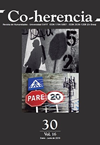Alternative worlds without female voices: Las Violetas son flores del deseo by Ana Clavel y Lusus naturae by Teresa P. Mira de Echeverría
Main Article Content
Keywords
Ustopia, utopia, dystopia, science fiction, posthumanism, contemporary Mexican literature, contemporary Argentine literature
Abstract
This paper explores the contrasting variety of directions and approaches of two Hispanic American writers who have used motifs and worldviews related to dystopian narrative in their novels. On one hand, the design and commercialization of prepubertal dolls, in an environment of clandestine desires and secret societies, as explored by the Mexican writer Ana Clavel in Las Violetas son flores del deseo (2007). On the other hand, the futile search for an original human being in the futuristic extrapolation Lusus naturae (2016), by Argentine novelist Teresa P. Mira de Echeverría. The factor integrating these disparate views is the conspicuous absence of voice, agency or transformative faculty on the part of female characters in both stories.
Downloads
References
Atwood, M. (2011a). In Other Worlds. SF and the Human Imagination. New York: Nan A. Talese/Doubleday.
Atwood, M. (2011b, 19 de octubre). Margaret Atwood: The road to Ustopia. The Guardian. Recuperado de https://www.theguardian.com/books/2011/oct/14/margaret-atwood-road-to-ustopia.
Atwood, M. (2014). Stone Mattress. Nine Tales. New York: Nan A. Talese, Doubleday.
Baccolini, R. (2004). The persistence of hope in dystopian science fiction. PMLA, 119(3), 518-521.
Barr, M. S. (1992). Feminist Fabulation: Space/Postmodern Fiction. Iowa City: University of Iowa Press.
Cano, L. (2006). Intermitente recurrencia. Buenos Aires: Corregidor.
Cawelti, John G. (1976). Adventure, Mystery, and Romance: Formula Stories as Art and Popular Culture. Chicago: University of Chicago Press.
Clavel, A. (2007). Las Violetas son flores del deseo. México: Alfaguara.
Collins, S. (2008). The Hunger Games. New York: Scholastic Inc.
Cox, D., y Levine, M. (2016). “I am not living next door to no zombie”: Posthumans and prejudice. Critical Philosophy of Race, 4(1), 74-94. DOI: 10.5325/critphilrace.4.1.0074
Findlen, P. (1990). Jokes of nature and jokes of knowledge: The playfulness of scientific discourse in early modern Europe. Renaissance Quarterly, 43(2), 292-331.
Giorno, R. (2013). Entrevista a Teresa Pilar Mira de Echeverría. Axxón, (242). Recuperado de http://axxon.com.ar/rev/2013/05/entrevista-a-teresa-pilar-mira-de-echeverria-ricardo-giorno/.
Haraway, D. (1990). A manifesto for cyborgs. Science, technology, and socialist feminism in the 1980s. In L. Nicholson (Ed.), Feminism/Postmodernism (pp. 190-233). New York: Routledge.
Hernández, F. (1983a). Las Hortensias. En Obras completas de Felisberto Hernández. Tomo 2 (pp. 176-233). México: Siglo Veintiuno Editores.
Hernández, F. (1983b) Muebles el canario. En Obras completas de Felisberto Hernández. Tomo 2 (pp. 156-159). México: Siglo Veintiuno Editores.
Jameson, F. (1982). Progress versus Utopia; Or, Can we imagine the future? Science Fiction Studies, 9(2), 147-158.
Lavery, J, (2013). Ana Clavel’s Las Violetas son flores del deseo and peritextuality. Hispanic Research Journal, 14(2), 159-174. DOI: 10.1179/1468273712Z.00000000044
Martin, G. (2015). From the love of robots. Posthumanism in Latin American Science Fiction Between 1960-1999. (Doctoral Dissertation), University of Kentucky. Recuperado de https://uknowledge.uky.edu/hisp_etds/21.
Mira de Echeverría, T. (2016). Lusus naturae. Recuperado de http://www.ficcioncientifica.com/pages/lusus_naturae
Mira de Echeverría, T. (2018). Teresa Mira de Echeverría. Cuentos, novelas, ideas... Recuperado de http://teresamira.blogspot.com/p/hola.html
Mohr, D. (2005). Worlds Apart? Dualism and Transgression in Contemporary Female Dystopias. Jefferson, NC: McFarland & Co.
Said, E. W. (1979). Orientalism. New York: Vintage Books.




